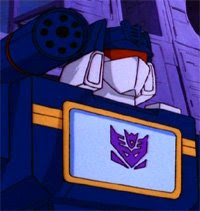Today, Laserbeak reports continuing commentary on Islam.
When you read my chatter on either my blog or any MB posts, I make a lot of cartoon references. Bill Whittle makes pop culture references. On the latter's site, someone pooh-poohed his Trek chatter in the comments section.
Something along the lines of: POWER was a masterful display of wordplay, beautifully expounding on various points--only to be marred by references to pop culture.
I take umbrage to that. I was on ATTCM once, posting an intriguing scenario involving the G1 Transformers in "our world"; someone commented, saying: "This is real life! How can you possibly trivialize it with a 'cartoon'?"
Sigh. This is an outrage! Whittle and I live in a country where our most quoted philosophers range from Baptist reverends to baseball coaches.
Furthermore: Spock, Kirk, McCoy, Data, Worf, Picard--all are part of a myth. Optimus Prime and Megatron: part of another myth. Batman, Spiderman: two more myths. Lion-O, hero of yet another American myth.
Asking Americans to ignore their pop culture is like asking an ancient Greek to ignore the Greek pantheon. I will cite cartoons nearly as much as Scripture(which is why I'm thankful for Superbook).
Even our professional writers make references to popular fiction. Despite the fact that my exposure to J.R.R. Tolkien is limited to those LotR cartoons I saw during Thanksgiving, I know that a writer made reference to "the Orcs" that wanted to destroy civilization.
What makes Gandalf any different than Skywise? [other than Gandalf's extra finger. :)] Don't the X-Men suffer persecution and hatred?
The fact that a person can take segments of our life as humans and make analogies to fiction shouldn't cause anyone to look down their noses. Not at all.
Is Transformers a cartoon? Yes. I'll even concede that it was, first and foremost, a marketing ploy concocted by toy companies in America and Japan. But it was effective enough to get us to suspend our disbelief; to care so deeply for Optimus Prime--a character that could never exist--that not only did children shed tears at "his" passing, but it affected the fate of a beloved character on another cartoon! [and that was the usual set of kid fans that grew up on G1. don't get Raksha started on the treatment of Starscream....]
Batman, Spiderman, Star Wars: these are the continuations of American tall tales. Like Paul Bunyan, John Henry(STEEL!), and Johnny Appleseed. Just our young nation's contribution to the richness of world folklore, like 1001 Arabian Nights, and Journey to the West. (which, in turn, gave Japan--and then us in the US--Dragon Ball/Z/GT. and yes, something good other than the codification of algebra did come from the ME.)
What was the purpose of European fairy tales, except to admonish and exhort the young to follow a certain path? And while we respect Shakespeare as a great writer now, back in his day he was basically a TV show creator/producer. [heck, we steal a lot of the man's material--itself cribbed from other sources. Will, like most of today's anime dubbing companies, was paid to write fanfic.]
We admire characters like Data and Superman because they embody qualities that we want in ourselves. Some people can resonate with--and resent--Sesshoumaru's pissy attitude over his brother. (despite the fact that Fluffy's from another time and culture....)
Though our fictional characters are fake indeed, they're real in a sense--because skillful writers had worked hard to help us suspend our disbelief at the thought of an alien from the planet Krypton adopted by a human couple. In said Kal-el's case, many skilled writers and no-talent hacks plied their trade to add to his mythos; fundamentally of little difference from Homer's Iliad and Odyssey--with the exception that Homer was writing about gods he believed in.
Consider WWE wrestling. Consider Hollywood, CA. Both create myths and legends that require us to watch in faith--if only for an hour or so. From birth to death we have this going on.
The reason, ultimately, why some movies get bad reviews from Roger Ebert? Because he sees the god of the machine; if we expect the Wizard of Oz, and we see the man behind the curtain...the "spell" is broken. We can't suspend our disbelief.
So when Bill Whittle makes a pop culture comment, it's a part of understanding an American perception--a human perception--of events in the world. It most emphatically shouldn't be sneezed at.
Friday, October 17, 2003
Subscribe to:
Post Comments (Atom)




No comments:
Post a Comment